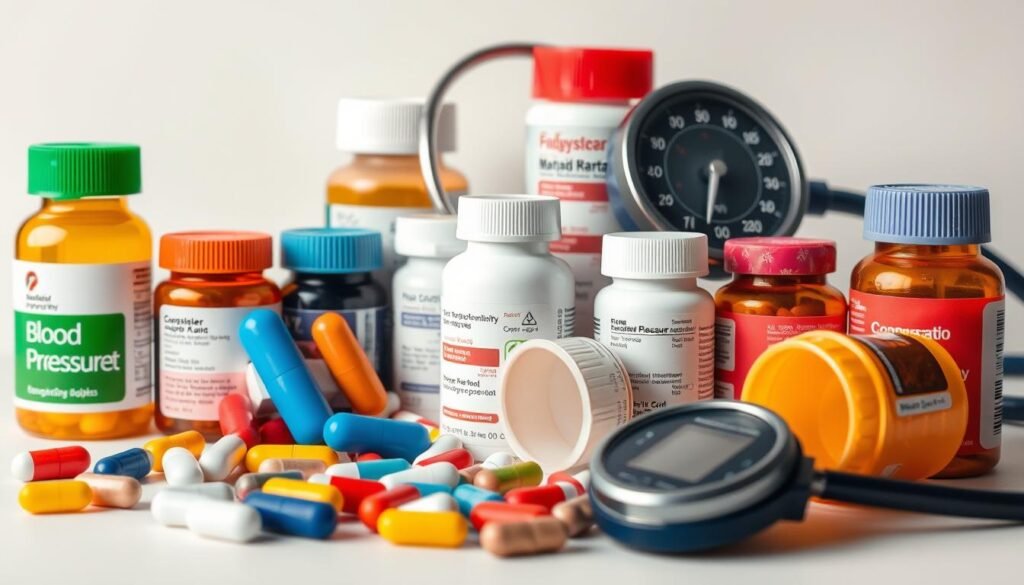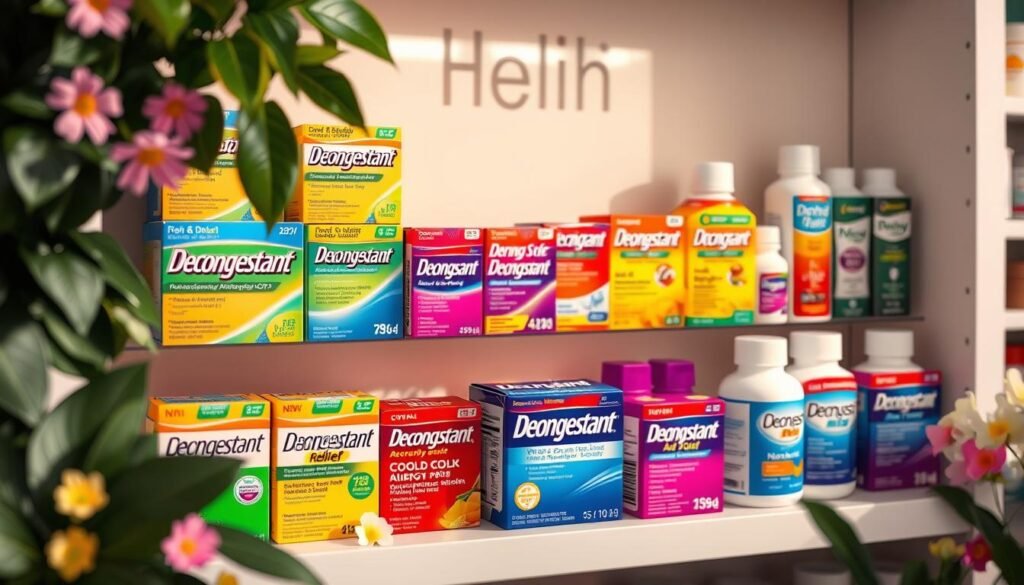About half of American adults have high blood pressure. This fact highlights the need to be careful when dealing with nasal congestion. Especially if taking hypertension medications. Some decongestants can raise blood pressure. This makes complex medication schedules even more challenging. It’s vital to understand the risks of mixing blood pressure drugs and decongestants. Doing so helps prevent serious health issues. Always get advice from a healthcare professional before taking new medication. This piece will look into how blood pressure medications and decongestants interact. It aims to help readers make safer health choices.
Key Takeaways
- High blood pressure affects about half of U.S. adults.
- Certain decongestants may raise blood pressure and interfere with medications.
- Consult healthcare providers before using over-the-counter medications.
- Safe alternatives include antihistamines and acetaminophen-based medications.
- Assess all medication interactions to avoid dangerous side effects.
Understanding High Blood Pressure and Its Risks
High blood pressure, or hypertension, affects nearly half of U.S. adults. It can lead to heart disease and stroke. Knowing your blood pressure is key to staying healthy.
Many things can cause high blood pressure. Eating too much salt is a big factor. Other causes include not being active, smoking, and genetics.
It’s vital to manage high blood pressure to avoid serious health problems. This means checking your blood pressure often. Eat well, stay active, and follow your doctor’s advice. Doing this early can stop damage before it gets worse.
People with high blood pressure should also watch their use of over-the-counter meds. Some cold medicines can make blood pressure worse. Knowing which medicines to avoid helps you make better choices for your health.
| Health Risk | Description |
|---|---|
| Heart Disease | Increased pressure can damage arteries and lead to heart complications. |
| Stroke | High blood pressure increases the risk of blood clots and stroke. |
| Kidney Damage | Hypertension affects blood vessels in the kidneys, impairing their function. |
| Vision Loss | Damage to blood vessels in the eyes can result in vision impairment. |
| Heart Attack | Chronic high blood pressure can lead to heart attacks due to heart muscle strain. |
What Are Decongestants and How Do They Work?
Decongestants are medicines aimed to ease nasal congestion. This symptom is often seen with colds, allergies, or sinus problems. These drugs are vital for treating stuffed noses by acting on the blood vessels within.

They work by making the blood vessels in the nose narrower. This reduces swelling and opens up airways. So, you can breathe easier. You might know some decongestants like pseudoephedrine and phenylephrine. They come in pills, liquids, sprays, and drops.
- Decongestants should not be recommended for individuals with high blood pressure due to potential risks.
- It’s advisable that children aged 6 to 11 do not take decongestants for longer than five days to avoid complications.
- Children under 6 years of age should generally not be given decongestants.
- Nasal sprays and drops must be limited to one week of use to prevent rebound congestion.
Side effects from decongestants vary from mild to severe. Most people might have a headache or dry mouth. Very rarely, some might have hallucinations. Be careful, as these drugs can affect other medications. This can raise blood pressure or cause bad reactions, especially with painkillers or antihistamines.
With these treatments sold over the counter, knowing how they work and how to use them right is key. This ensures you get relief safely.
Blood Pressure Medications and Decongestants: A Risky Combination
Taking Blood Pressure Medications and Decongestants together is risky for people with high blood pressure. Decongestants narrow blood vessels, which can make blood pressure go up. It’s important to know how decongestants affect blood pressure to manage symptoms safely.
Impact of Decongestants on Blood Pressure
Studies show that decongestants like pseudoephedrine can slightly raise systolic blood pressure. A study found a rise of about 0.99 mm Hg. This might seem minor, but for those with high blood pressure, small changes can be a big deal.
Topical decongestants such as naphazoline and oxymetazoline are also worrisome. There’s not much information on their blood pressure effects. This is a concern, especially for older people who might be more affected by medications. With around 33% of U.S. adults having high blood pressure, choosing safe medications is key.
Common Decongestants That May Affect Blood Pressure
There are several common decongestants, and their potential side effects are important to know:
- Pseudoephedrine – Found in over 135 medications, it can raise blood pressure and heart rate.
- Phenylephrine – Often used for nasal congestion, but its effects on blood pressure aren’t well-known.
- Naphazoline – A topical decongestant that could cause rebound rhinitis with long-term use.
- Oxymetazoline – Similar to naphazoline, it also carries overuse risks.
- Ephedrine – Stimulates the heart and blood vessels, increasing blood pressure risk.
When choosing over-the-counter (OTC) medicines, it’s vital for those on blood pressure medication to read labels and talk to healthcare providers before mixing any treatments.

Identifying OTC Medicines for Cold and Allergy Relief
Finding the right over-the-counter (OTC) drugs for colds and allergies is tough. It’s even harder for those with high blood pressure. Many OTC decongestants are unsafe for them. Knowing which products to avoid and the safer alternatives is key.
Common OTC Products to Avoid
If you have high blood pressure, be wary of certain OTC cold and allergy meds. Avoid these:
- Tylenol Cold and Flu: Contains decongestants that can increase blood pressure.
- Advil Multi-Symptom Cold and Flu: Ingredients in this may affect blood pressure management.
- Pseudoephedrine-based products: Great for clearing your nose but bad for blood pressure.
Safe OTC Options for High Blood Pressure Patients
But there’s good news. People with high blood pressure have safer choices. These include:
- Coricidin HBP: Made for high blood pressure patients, it skips the risky ingredients.
- DayQuil High Blood Pressure: Deals with cold symptoms safely, without affecting blood pressure.
For more info on picking the right OTC meds for colds and allergies, check out this helpful article.

Understanding the Side Effects of Decongestants
Nasal decongestants help with congestion quickly. But, it’s important to know about possible side effects. Increased heart rate, insomnia, dizziness, and higher blood pressure are common. This is especially key for the 122 million Americans with hypertension.
Pseudoephedrine is a well-known decongestant. It clears nasal blockage but can tighten blood vessels. This could up blood pressure levels. A 2005 study showed pseudoephedrine slightly raises blood pressure and heart rate. The FDA requires warnings on decongestants for heart disease, high blood pressure, diabetes, or those with urination issues, unless a doctor says otherwise.
Choosing over-the-counter meds carefully is important for those with high blood pressure. Pharmacists often suggest options like Coricidin HBP and DayQuil HBP for those with hypertension. It’s crucial to check labels to avoid substances that can worsen blood pressure. Some NSAIDs, for instance, risk causing heart problems.
After using a decongestant, watching your symptoms is key. Different people may have different reactions. Talking to healthcare experts can help you manage side effects. They can guide on the impact on your health.
Alternative Treatments for Nasal Congestion
Nasal congestion is annoying, especially for people watching their blood pressure. They might want to avoid common decongestants since they can raise blood pressure. Luckily, there are many non-medical treatments and safe medication options available.
Non-Drug Remedies
There are several safe non-drug ways to ease nasal congestion for those with high blood pressure. Here are some good choices:
- Saline nasal sprays: These sprays moisten the nasal paths and clear blockages.
- Humidifiers: Moist air can ease congestion, which is very helpful in dry winter.
- Steam inhalation: Steaming helps loosen mucus, reducing sinus pressure.
- Head elevation: Sleeping with more pillows can aid in drainage and lessen congestion.
Adding these non-drug remedies to your daily life can make a big difference. You don’t always need medication to feel better.
Prescription Options for High Blood Pressure Patients
If you need extra help, there are safe prescription choices for those with high blood pressure. Antihistamines, like diphenhydramine (Benadryl), are safe and can help with allergy-caused congestion. Other options include:
- Phenylephrine: This decongestant has less effect on blood pressure than others.
- Coricidin: It’s formulated particularly for people with hypertension.
- Guaifenesin: In Mucinex, this expectorant makes mucus flow better and is safe for those with high blood pressure.
Remember, checking your blood pressure regularly is vital while trying these options. A mix of non-drug methods and the right prescriptions can effectively manage nasal congestion for high blood pressure patients.
Consulting Healthcare Professionals
Managing high blood pressure takes careful thought, especially when choosing medications for other conditions. Talking to healthcare professionals is key. They give vital advice, ensuring a well-informed strategy for handling blood pressure. By discussing with doctors or pharmacists, patients learn about how decongestants and blood pressure meds interact. This knowledge is crucial for their health.
Decongestants can raise blood pressure and heart rates, which is risky for people with hypertension. Healthcare experts can suggest safe meds for these patients. They warn against using NSAIDs and some cold remedies that could make high blood pressure worse. It’s important for patients to tell their healthcare provider about all the meds they’re taking. This includes over-the-counter ones, to fully evaluate any risks or bad interactions.
If someone needs an alternative for issues like a stuffy nose, a healthcare professional can recommend safer choices. These options won’t mess up their ongoing treatment plans. It highlights why talking to healthcare experts is critical, no matter how independent the patient is. Being active in managing blood pressure helps avoid further problems and leads to lasting health.
Guidelines for Using Decongestants Safely
Nasal congestion can make daily life hard. Pseudoephedrine and phenylephrine offer relief. But, it’s key to use them safely, especially if you have high blood pressure.
- Don’t use decongestants for more than seven days. Using them longer can cause problems.
- Keep an eye on your blood pressure. This helps see any changes after taking a decongestant.
- Pick meds safe for high blood pressure. Check the ingredients to avoid those that raise blood pressure.
If you’re over 65 and have high blood pressure, be extra careful. Decongestants in cold and flu meds can make your blood pressure go up.
It’s smart to talk to a doctor for advice. They might suggest nasal saline sprays or antihistamines instead. These options are safer for heart issues. Stay up-to-date by following the latest research on decongestants.
Being safe with decongestants means sticking to guidelines and knowing your health status.
Conclusion
Mixing blood pressure meds and decongestants safely is key for health. This piece has shown the risks of oral decongestants for folks with high blood pressure. Around 33% of U.S. adults have this condition, making knowledge vital.
Topical nasal decongestants might be a safer option to consider.
To wrap up, always get advice from healthcare experts before making a choice. Pharmacists can help pick the right treatment. It’s also wise to carefully read medication labels to prevent problems. For more details, you can check out this informative source.
Choosing safer options and understanding your meds can help you handle nasal congestion without harming your blood pressure. Being informed and cautious is essential for better health and a smoother experience during cold and allergy seasons.